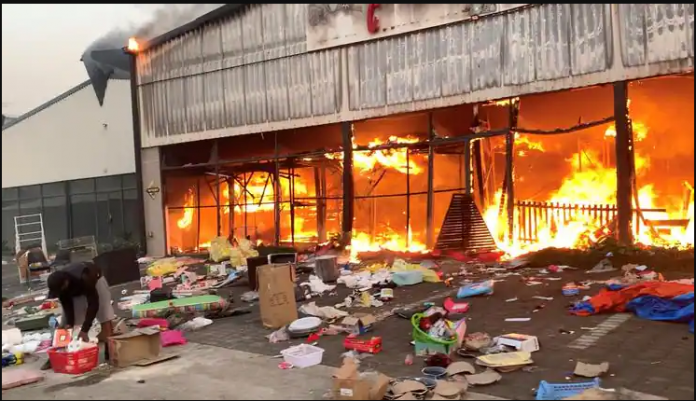Violent demonstrations, which erupted in South Africa after the jailing of former President Jacob Zuma last week, has claimed 70 lives so far and damaged hundreds of businesses.
South Africa has been plunged into the “worst civil unrest” since the end of white-minority rule in 1994, with the country being gripped by riots and lootings. Th turmoil has so far claimed more than 70 lives, and has caused immense loss to hundreds of business establishments.
What has triggered the violence?
Violent demonstrations erupted in the country after the jailing of former President Jacob Zuma. He handed himself over last week to start a 15-month prison sentence in a contempt of court case.
What led to Zuma being jailed?
Zuma was asked by court to testify before an anti-corruption commission which is examining graft cases dating back to the days of his presidency. His refusal to testify to the commission led to contempt of court charges being framed against him. He was ordered to serve 15 months in prison.
Zuma supporters perceive attack on ethnic group ‘Zulu’
Support for Zuma stems partly from his image as a man of the people during his nine years in power until 2018, and because some see his jailing as an attack on the nation’s largest ethnic group, the Zulu.
His supporters, who believe he is the victim of a political witch-hunt, burned tyres and blocked roads in his home province of KwaZulu-Natal. The protests snowballed into a major agitation, and led to violent demonstrations in several provinces.
Poverty, unemployment fuels crisis
Although the violence was largely driven by Zuma’s arrest, the underlying factors also include widespread poverty, inequality and unemployment among the masses.
The hardship that persists 27 years after the end of apartheid is a major reason why hundreds of shops and dozens of malls have been stripped bare.
Statistics agency data show roughly half of the country’s 35 million adults live below the poverty line and that young people are disproportionately affected by unemployment.
According to the World Bank, South Africa remains a two-speed economy with “one of the highest inequality rates in the world”.
The country, which is also the African continent’s most industrialised economy, had already entered into a phase of recession before the onset of COVID-19 pandemic last year.
The economy contracted by seven percent last year, plunging two million more people into poverty, according to the World Bank.
The unemployment rate hit a record level of 32.6 percent in the first quarter of 2021. Two young people out of three are out of a job.
Criminals involved
According to the police, criminal gangs have taken advantage of the ongoing stir over Zuma’s imprisonment. They are infiltrating among the protesters with the intent to break into shops, stores and warehouses. Over 1,200 alleged members of such gangs have been rounded up since the agitation turned violent.
Protests reflect deep divisions in ruling ANC
The violence which has engulfed South Africa also reflects the deep divisions that has plague the country’s ruling party, African National Congress (ANC).
According to experts, the ANC leadership could have averted the current crisis if it would had prevented the arrest of Zuma.
Some party members, considered as Zuma loyalists, have been accused of fuelling the unrest through inflammatory messages.
An account bearing the name of Duduzile, a prominent ANC leader, has repeatedly posted images and videos of protests and violence on Twitter with the rallying cry “Amandla!” (Power!) used during the anti-apartheid struggle.
ANC has assured to take disciplinary action against Duduzile if it is found that the Twitter account was genuinely operated by her.
With Reuters and AFP inputs


